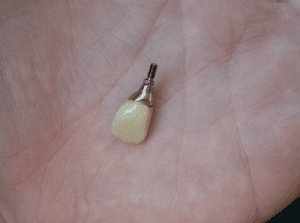 Dental implants are considered as the best teeth replacement option in terms of benefits, success rate and functioning. Dental implants have less than 2% of failure rate while studies reveal that the rate of failure for regular dentures and crowns in the first 10 years is about 15-20%. Dental implants in Melbourne cost much more than the other alternatives for missing teeth. However, considering the effectiveness and durability, dental implant cost in Melbourne is usually worth it. To make the most out of your investment, it is important to understand the causes for an implant failure so that you can avoid them. They are given below,
Dental implants are considered as the best teeth replacement option in terms of benefits, success rate and functioning. Dental implants have less than 2% of failure rate while studies reveal that the rate of failure for regular dentures and crowns in the first 10 years is about 15-20%. Dental implants in Melbourne cost much more than the other alternatives for missing teeth. However, considering the effectiveness and durability, dental implant cost in Melbourne is usually worth it. To make the most out of your investment, it is important to understand the causes for an implant failure so that you can avoid them. They are given below,
Implant infection
Also known as Pre-implantitis, this can occur due to a variety of reasons such as smoking, bad oral hygiene and poor compliance. Pre-implantitis can lead to the inflammation of gum and the bone surrounding the implant, often causing bone loss. The loss of bone around the implant in turn would loosen it over time. If caught early, dentist would clean the impacted area with antibacterial solutions and prescribe antibiotics to halt the progress of the infection. Unfortunately in certain cases, the patients would not notice the infection before it is too late and the dentist would have to remove the implants, do bone grafting and fix new implants after that part is healed.
Inability to heal
Before the placement of dental implants in Melbourne, your dentist would assess your mouth thoroughly. He/she would also ask about your medical history to make sure that you do not suffer from any ailments or take medications that would create unnecessary complications in the future. Conditions such as uncontrolled diabetes, thin gums, poor immune system, alcoholism etc. would hinder the healing process, which is very important for the success of the implants.
Lack of performance
The dentist who performs the dental implant surgery in Melbourne must have a thorough knowledge about the osseo-integration process and possess the required surgical skill. If the performance is poor, then the implant would most probably fail. It can also cause pain, swelling and infection.
Lack of bone
Implant needs to be firmly fixed into the jawbone for a successful teeth restoration. This is only possible if there is an adequate bone growth around the implant. People who are suffering from missing teeth for a long period would have surely lost some bone volume around that area. If that is the case, the dentist would perform bone graft to correct this deficiency. If this condition is ignored, then the implant would fail.
Paying no heed to the post-care instruction
Your dentist would provide you instructions when you are in the recovering period like avoiding strenuous activities, maintaining proper oral hygiene, taking regular medications and keeping away from particular foods to ensure the longevity of the implants. If they are not followed properly, implant failure might occur.
Thus, the dentist and the patients should have to work together to minimise the chance of implant failure.
